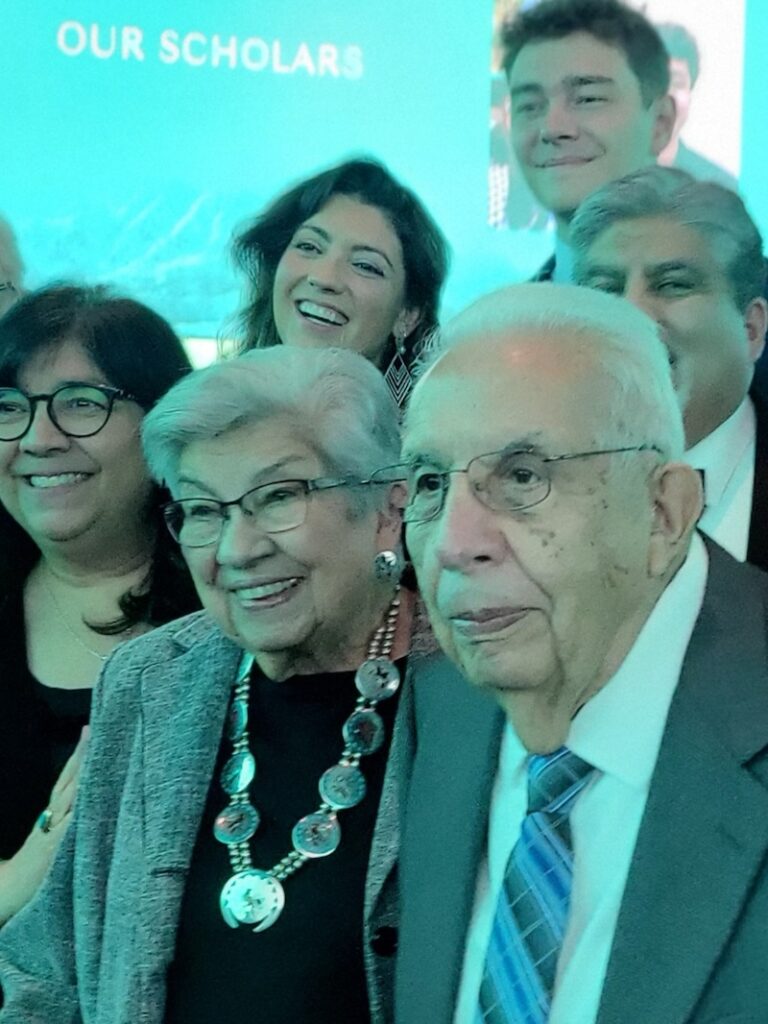The very idea of going to college never crossed Evangeline ‘Vangie’ Sena’s mind as she was growing up in the San Luis Valley. Of course, when she was a young girl, a young Latina, going to college was something others did. “I wanted to go,” she said, “but I didn’t think I could.”
But all that changed when her brother, fresh out of the military at the end of World War II, came home and announced he was college bound—on the G.I. Bill. She didn’t know it at the time, but his announcement changed the course of her life.
After graduating from high school in Blanca, Colorado, in 1953 and where, incidentally, she was the class valedictorian, she enrolled at Adams State University, then Adams State College.
“I wanted to become a nurse,” she said, “but we didn’t have the money.” So, instead, she took the teaching route. “That’s about all you could be if you went to Adams.”
In a recent Sunday afternoon chat, her husband, Val, told a similar story. Born in Fort Garland, he moved with his family as his father pursued various jobs, including carpenter, shepherd and coal miner. His family even moved to Los Angeles where his father found work building sets for MGM. But after nine years in California, they moved back to the Valley. “I went from a junior high that had 1,200 students” in Los Angeles, to Fort Garland. It was culture shock.
Outside of school, he said, his father “kept me busy shoveling and hauling coal” to various customers around town. Seeing no future in that, he joined the Air Force where “I learned a lot about electronics and mechanics.” It also got him out of Fort Garland. He wanted more and through the military, he got it.
His Air Force job convinced him that becoming an electrical engineer was a real possibility. Also, it might keep him close to airplanes, something he enjoyed in the service. It was also a job that would allow him to use his brains rather than his brawn. That, too, had a certain appeal.
In 1957 he also enrolled at Adams State where, taking advantage of credits earned in the military, he graduated in three years. In 1959 the Senas married.
Her first teaching job took her to Pueblo where she taught for three years. “I loved the kids,” she said. “They were poor, like I had been, and they struggled with reading,” she recalled. But other teachers lent a hand, helping out “a beginning teacher.”
The couple, now parents, moved to Denver in the early 1960’s. Mr. Sena “found a job at Lowry (Air Force Base)” working as an instructor teaching young airmen about missiles. The job ended, he said, when “President Kennedy canceled the program and there was a reduction in force,” layoffs.
But in no time, he found work at Cole Junior High as a math teacher. The school was populated with African American and Latino students. It was also at Cole where he started something novel for the times, the Latin American Student Club. The next year, at the behest of the late Bernie Valdez, he moved on to Horace Mann Junior High where Valdez again asked him to be the coordinator of all Latin American Student Clubs in DPS.
As he was moving through the DPS system as a teacher and climbing the ladder to his first assistant principal job at Kepner Junior High, his wife was taking time away from teaching to be a homemaker. Their family had now grown to six, four being children. But in 1970, she went back to work.
“At Del Pueblo I was the librarian,” a job she held for nine years. And while she enjoyed it, she had her sights set on bigger things. She became a principal then the long-ago rookie teacher who ‘wet her feet’ in Pueblo, set her sights on a Ph.D. and enrolled at CU-Boulder. Interesting, at CU she would lunch each day with her daughter, a CU student.
By this time, Val, was establishing himself as a school principal, too. He went from Dean of Boys at West to the school’s top job.

Over their careers, both put a high value on education and that led them to LAEF, the Latin American Educational Foundation. Since it was formed in 1949, LAEF has gifted more than 7,000 Latino students with more than $7 million in scholarships. The Senas have gifted one of their own.
At the recent 75th anniversary of LAEF, the Senas were recognized for their contributions to education and as scholarship donors. Their scholarship was awarded to University of Northern Colorado soon-to-be rising senior, Alex Archuleta. Archuleta plans to pursue a career in preschool education or become a kindergarten teacher.
“They feel like family,” Archuleta said after meeting the Senas. She met them to thank them for their help. “It was a difficult time for me,” she remembered. “My own grandmother was in the hospital,” said the UNC junior. But the Senas, “were very welcoming, very gente.”
The Senas thought similarly of Archuleta. “She’s just very nice,” they said. “We think the world or her, too.”
With each closing in on 90, the Senas say education has been a wonderful part of their lives. It allowed them to uplift so many young people who might otherwise have been lost in a system not entirely friendly or understanding.
With her hard-earned Ph.D., Mr. Sena joked that his wife outranks him since he “only became a principal,” before quickly adding, she always has outranked him. But as the conversation continued, it also became clear, they’ve succeeded because they’ve always been equals as parents and partners.
The Senas also had an unquantifiable impact on literally thousands of lives, many of whose names have become blurred simply because of time and volume. But while they may not remember the many students who’ve passed through their lives, they are not forgotten by those whose lives they touched.


